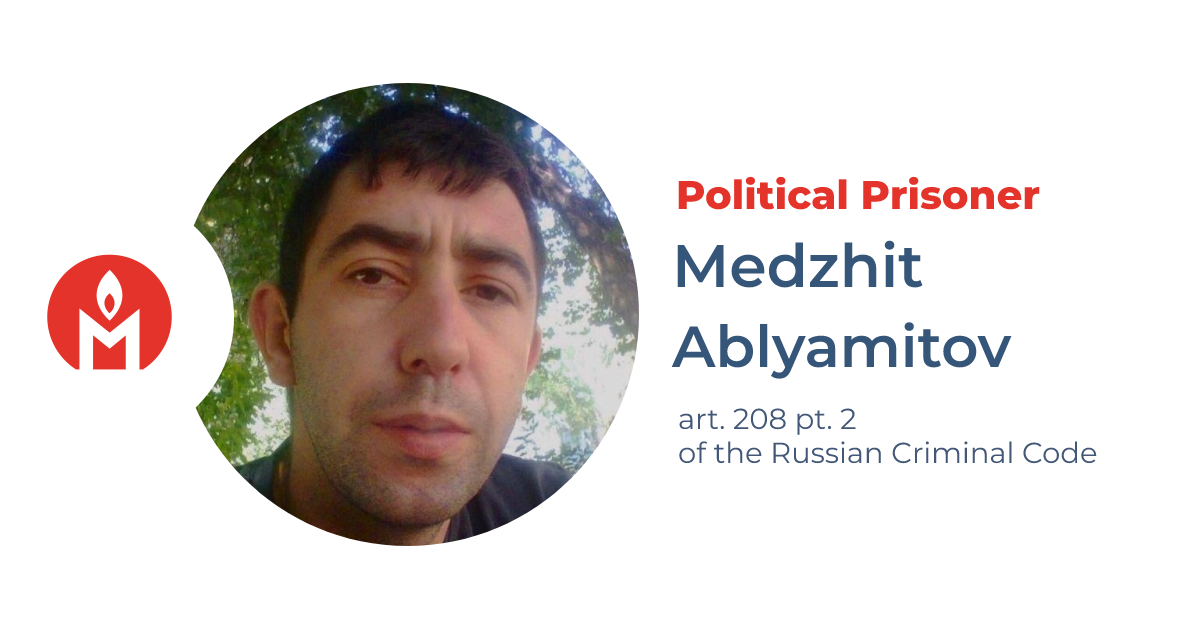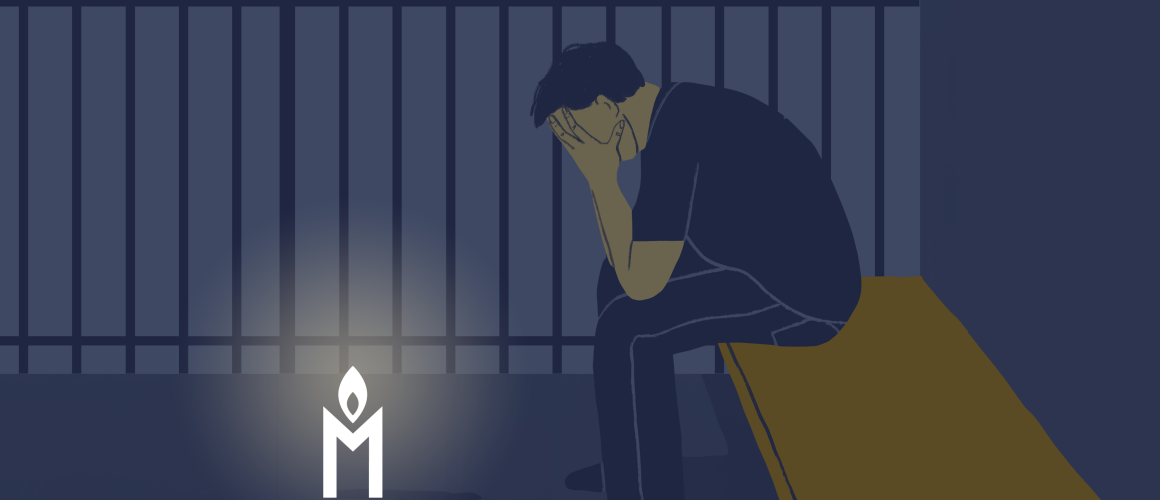Medzhit Ablyamitov is a political prisoner
Medzhit Ablyamitov was sentenced to six years in a strict regime penal colony on charges of participating in the Crimean Tatar battalion
The human rights project ‘Political Prisoners. Memorial’ considers Medzhit Ablyamitov a political prisoner in accordance with international standards. Ablyamitov’s criminal prosecution on charges of participation in an illegal armed group is unlawful and based on his political views, citizenship and ethnicity. During the criminal proceedings, Ablyamitov’s right to a fair trial was violated and the criminal case itself was based on fabricated evidence.

We demand the immediate release of Medzhit Ablyamitov and that all criminal charges against him be dropped.
Who is Medzhit Ablyamitov and what are the charges against him?
Medzhit Ablyamitov was arrested in August 2020 and charged with participation in an illegal armed group (Article 208, Part 2, of the Russian Criminal Code). According to the Investigative Committee, in March 2016 Ablyamitov had left Crimea to participate in the Crimean Tatar battalion named after Noman Chelebidzhikhan. In doing so, he allegedly engaged in farming, guarding the territory of the battalion and served on active duty. In July of the same year, Ablyamitov returned to Crimea, but did not submit a statement to the Russian authorities that he had voluntarily ended his participation in the illegal armed group, and therefore, according to the investigation, he remained a participant in it.
On 23 March 2021, the Russian-controlled Kirov district court in Crimea sentenced Ablyamitov to six years in a strict regime colony.
Ablyamitov himself did not admit his guilt. He maintained that in 2016 he had participated in the activities of Asker, a civil society association registered in Ukraine, but never took up arms or had any combat training.
Why do we consider Ablyamitov a political prisoner?
The case of Medzhit Ablyamitov is one of many such prosecutions of Crimean Tatars for alleged involvement in the Chelebidzhikhan battalion. Prosecutors have repeatedly used the same persons, who previously testified as being part of the battalion, as witnesses. In Ablyamitov’s case, as in most other similar cases, the investigation had no material evidence of the convicted person’s participation in a paramilitary group or their taking part in firearms training or combat operations.
Having studied the materials of the case, we have concluded that Ablyamitov’s participation in the Chelebidzhikhan battalion has not been proven. Moreover, we believe the mere fact of participation in this formation would not constitute an offence. Article 208, Part 2, of the Russian Criminal Code on participation in an illegal armed group criminalises ‘participation on the territory of a foreign state in an armed formation, not provided for by the laws of that state, for purposes contrary to the interests of the Russian Federation.’ We consider that this article cannot be applied to members of the Chelebidzhikhan Battalion, still less the Asker civil society association.
The creation of the battalion was announced by the businessman Lenur Islyamov in September 2015. At that time, the leaders of the Mejlis of the Crimean Tatar People declared a civil blockade of Crimea. Members of the battalion checked goods crossing the ‘border’ with Crimea. Over the following two months, the Ukrainian government banned the delivery of goods and services to and from Crimea, with the exception of humanitarian goods. Since January 2016, members of the battalion or, to be more precise, the public association Asker that was created on its basis, carried out joint patrols with the Ukrainian Border Guard Service. The battalion has never taken part in military action.
In our view, despite the fact that the creation of this battalion by civil society actors was not enshrined in law, its activities cannot be considered illegal. Proof of this is the joint patrolling of the border with Ukrainian security forces. At the same time, it is not the battalion’s activities that are evidently contrary to Russia’s interests, but the illegal seizure of Ukrainian territories.
Further information about this case and the position of the human rights project, ‘Political Prisoners. Memorial,’ is available on our website.
Recognition of an individual as a political prisoner does not imply the project, ‘Political Prisoners. Memorial,’ agrees with, or approves of, their views, statements, or actions.
How can you help?
You can write to Medzhit Ablyamitov at the following address (letters must be written in Russian):
In Russian: 414057, г. Астрахань, ул. Рождественского, д. 6, ФКУ ИК-6 УФСИН России по Астраханской области, Аблямитову Меджиту Энверовичу, 1993 г.р.
In English: Medzhit Enverovich Ablyamitov (born 1993), Penal Colony No. 6, Russian Federal Penitentiary Service for Astrakhan region, 6 Rozhdestvensky Street, Astrakhan, 414057, Russia
You can also write an electronic letter using the Zonatelkom service or send a letter via the website of Crimean Solidarity.
Here you can donate to support all political prisoners in Russia.

